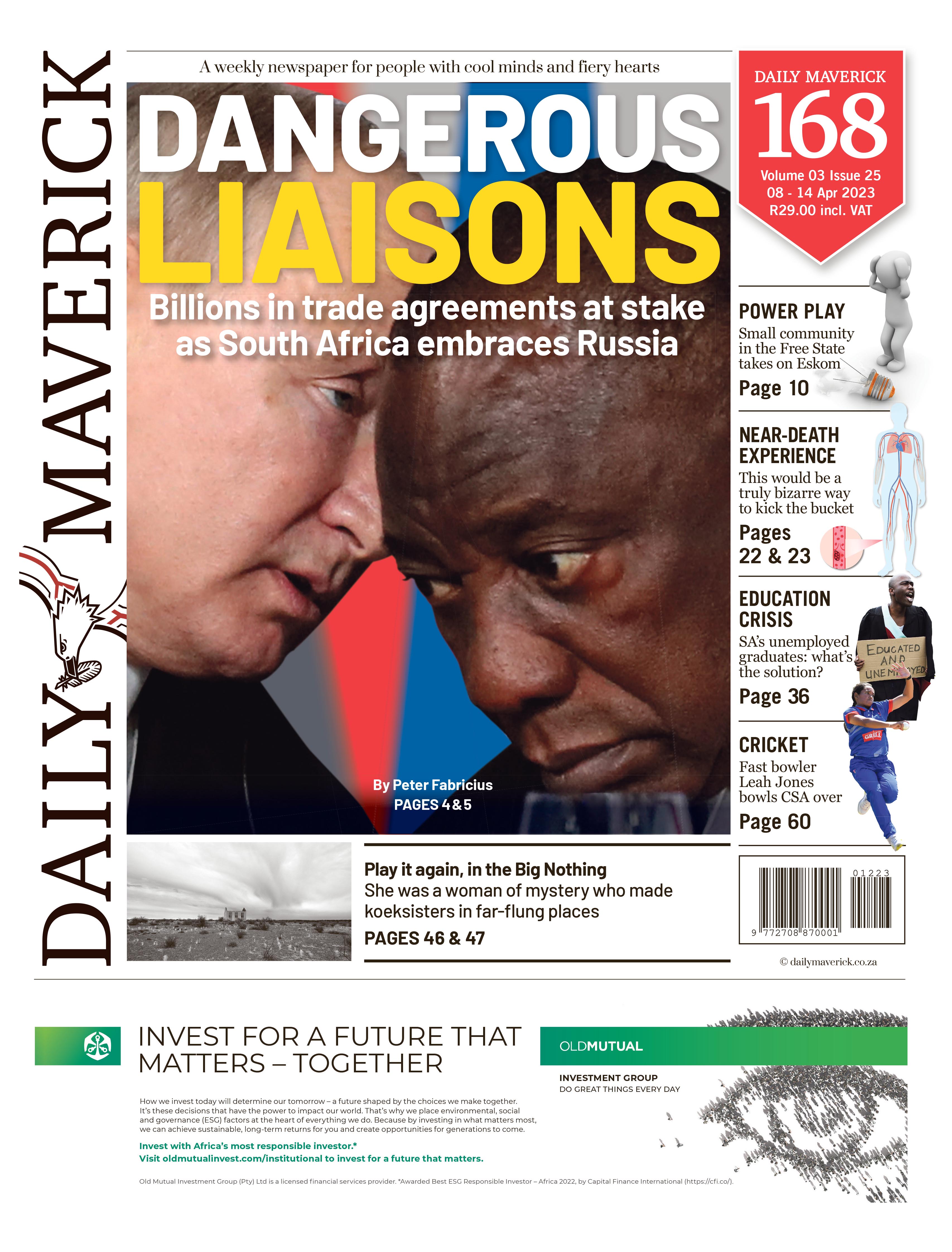A SERIES OF (UN)FORTUNATE EVENTS
A pulmonary embolism, dedicated doctors and nurses, and the bitter pill of medical aid co-payments

A personal story of the surrealism of being admitted to the intensive care unit with a pulmonary embolism and the realisation of how your medical aid insurance can disappoint you.
As luck would have it, my doctor is a stern, sensible woman who doesn’t beat about the bush. I’m fond of her, particularly because she has a weird sense of humour.
On 16 March, I went to see her about my dry eyes, and when I walked from her desk to the examination area 5m away, I was out of breath. She said that was very unusual, so she checked my oxygen. When she saw that it was in the high 80s, she became a little concerned because it should be in the high 90s. I had been experiencing shortness of breath for about a week and didn’t think anything of it.
Dr Renitha Sheobalak has been my general practitioner for more than 10 years. We know each other well. She immediately made me do a small battery of tests: Covid-19, sugar levels, lung function, regular blood pressure checks over a 30-minute period, an electrocardiogram and a clotting test I’d never heard of and whose name I can’t remember.
After the last test, the nurse moved me into a private room and closed the door behind her. A few minutes later, Sheobalak walked in quickly with a very worried look on her face.
Doc: “You need to go to a hospital right now.”
Me: “Ha ha!”
Doc: “I’m serious. Your blood clot test came back with very scary figures.”
Me: “The what now?”
Doc: “The blood clot test we did indicates something is wrong and I think it could be a pulmonary embolism, which would explain the shortness of breath, but…”
Me: “What the hell is that? Why is it so serious? Can’t you sort it out here? It’s Thursday. I’m on deadline, the paper prints tomorrow.”
Doc: “No! I cannot sort it out here. You have to go to a hospital. There could be clots in your lungs and arteries, and you could have a heart attack and die! People die from pulmonary emboli all the time.”
(I shot her a weird expression but she clearly wasn’t in the mood for my weirdness.)
Doc: “Sukasha, I’m not joking. If you don’t get yourself to a hospital immediately, I’m going to seriously consider breaking the rules and phoning one of your family members to tell them what’s going on.”
(At this point, I grudgingly accepted that I had to haul myself to a hospital at warp speed.)
Me: “Okay, okay, I get it. This is bad. I’ll go to the hospital right now.”
Doc: “Good. Which hospital do you want to go to? I’ll prepare the forms and speak to the relevant doctor.”
As I was taken into the medical intensive care unit (ICU) 2 at Milpark Hospital, I realised the seriousness of my situation and I felt a bit scared, but I also thought that this would be a truly bizarre way to kick the bucket.
A few days later a friend reminded me that my favourite tennis player, Serena Williams, had had two pulmonary embolisms that nearly killed her. My tennis pals jokingly call me Serena whenever I hit a hard, flat forehand, and they think it’s bizarre that I should share something as grim as this with one of the greatest tennis players of all time.

Sukasha Singh’s place setting at her doubles partner’s wedding a few years ago. (Photo: Sukasha Singh)

Serena Williams wears a catsuit that compresses her legs to reduce the risk of blood clots, on 2 June 2018, during the French Open at Roland Garros in Paris, France. (Photo: Cameron Spencer/Getty Images)
In the ICU
As the ICU nurses hooked me up to various beeping monitors, the pulmonologist arrived to ask me several questions and tell me about the tests I was going to have to determine whether there were clots in my lungs and what might have caused them.
A computerised tomography (CT) scan showed several clots in my lungs, so the doctor prescribed two injections of anticoagulant twice a day while further tests were ordered, but none of the tests revealed what might have caused the clot.
I don’t have a family history of clots, or the genetic conditions that increase the risk of blood clot formation, and I haven’t been travelling recently.
Two days later, a surgeon looked at my chart for a while and examined the test results, then chuckled to himself and said to me: “A pulmonary embolism, how’d you do that?” I also chuckled before pointedly asking him: “Aren’t you supposed to be answering that question?”
He admitted that the tests hadn’t identified a cause. That a sonar showed there was a clot in my left calf led him to believe that part of that clot had broken off and travelled up to my lungs, but they had no clue what caused the clot to begin with.
As a former general reporter who has done myriad crime stories, I’ve spent a fair amount of time in casualty wards and seen horrific injuries, but being in the ICU as a patient is quite a different experience.
In my time there, two patients about 10m away from me died, and one “crashed” and needed to be resuscitated about five times. I walked past his bed once while he was being resuscitated and seeing the huge blood-soaked swabs all over the small space he occupied almost made me sick.
It’s worth noting that when a patient is “crashing” (i.e. their vitals are dipping to the point where they’re knocking on heaven’s door), it doesn’t play out the way you see it on Grey’s Anatomy. On one occasion, that particular patient crashed at about 3.30am and there was a flurry of activity in the darkness as nurses rushed to stop the bleeding while trying to rouse the necessary specialists to resuscitate him.
There’s no shouting or drama, just a quiet determination by everyone involved to try to save the life that might be slipping through their fingers. The resuscitation went on for some time and when the lights came on just after 4am, the nurses were still trying to stop the bleeding as one of the other nurses with his earphones firmly in his ears danced gleefully to his own soundtrack into the ward as he started to prepare warm water for the patients who were waking up. Surrealism is the order of the day in the ICU.
Dedicated nurses
The person in charge of the ICU is the most senior nurse – her or his title is chief leader, which I initially thought was a bit funny, but I quickly grew to have a great deal of respect for the various chief leaders and all the nurses. The daytime chief leader was a smartly dressed woman with long eyelashes. One moment she was consoling family members and advising them about mortuary services, and the next she was shouting: “Why is that machine beeping? It’s not an ice cream truck, make it stop,” as a nurse scuttled off to silence the offending machine.
In the ICU, you’re hooked up to oxygen, a drip, a blood pressure cuff that automatically takes your blood pressure every hour, an oximeter and five leads on your chest that measure your respiration and heart rate. If any of these machines disconnects, it beeps – and, regardless of the time, a nurse will arrive to do the necessary checks to silence the noisy machine. Every night I was woken up several times by a nurse adjusting one of the leads that had come loose as I tried, mostly in vain, to sleep. I was never angry because I knew they were just doing their job, but it was a little unnerving.
Of course, it was nowhere near as unnerving as when the guys from the mortuary arrived to transport a body. The nurses tried hard to be discreet and they pulled all the curtains around everyone’s bed as the body was moved out of the ward.
They said they were having “prayer time”, but I knew what was going on. I wondered how many times they had to pretend to pray during the height of the pandemic when cold storage trucks were needed for all the people who died of Covid-19.
I have immense respect for nurses now, particularly for Vuyelwa, Monica, Zandile, Dipuo, Grace, Zodwa, Angel, Londiwe, Peter and all the others whose names I can’t remember. They quite literally have the shittiest job, yet they care for complete strangers in that effortless way that we take for granted, but really shouldn’t.
However, I have the opposite feeling about my medical aid, Discovery. While I’m grateful it is paying for most of my hospital stay, I’m disappointed that, despite the fact that I’ve contributed roughly half a million rand to it over the past 18 years, the insurer doesn’t see fit to pay the full amount for the CT scan or the tests my doctor ordered in her rooms. The seemingly ravenous army of Discovery actuaries has ensured that my medical savings are being wiped out by my hospital stay, while I also have co-payments to deal with.
Medical aids like Discovery should not be allowed to operate like traditional businesses. When you’re a medical insurer, there should be laws against you having billions in reserves while you continually charge your clients higher fees for constantly shrinking benefits. I pay R4,362 a month for my medical aid and not even this amount saves me from expensive co-payments.
What’s worse is that, while Discovery clearly spends a lot on the actuaries tasked with tweezing more money out of their clients every year, it spends very little on its customer service teams. I tried to add my mother as a dependant (because Fedhealth has been increasing her premium every month without explanation), and I was stuck for weeks in these groundhog day-type emails in which the applications team kept asking me the same questions over and over.
Discovery eventually agreed to add her as a dependant, yet despite my mom having been on a medical aid for more than 20 years, I would have to pay the ridiculously exorbitant penalty of 50% of the premium every month.
So, while this story is a big, heartfelt thank you to all the medical professionals who saved my life, it’s also a frustrated indictment of Discovery, which is supposedly the best medical aid in South Africa, but the fact that it would rather be obscenely rich than pay for the medication and services its clients deserve is fast becoming an incredibly bitter pill to swallow.
About pulmonary embolisms
- A pulmonary embolism is a blood clot that develops in a blood vessel (often in the leg) and then travels to the lung arteries, where it blocks the blood flow.
- Blood clotting is a normal process that prevents bleeding. The body makes blood clots and breaks them down all the time.
- When blood clots in a vein, it might be due to slowed blood flow, an abnormality in clot forming, or an injury to the blood vessel wall.
- Risk factors for a pulmonary embolism include certain genetic conditions, a family history of blood clotting disorders, situations in which mobility is limited (such as long flights), surgery or injury, old age, a previous history of clotting, obesity, smoking, certain medication such as birth control pills and certain medical conditions.
- Symptoms to look out for include sudden shortness of breath, irregular heartbeat, dizziness, chest pain that increases with breathing, palpitations, swelling in the leg, low blood pressure and coughing up blood. DM168
This story first appeared in our weekly Daily Maverick 168 newspaper, which is available countrywide for R25.






















I have been with discovery since its inception so I cannot in all honesty compare it to another. However, I assume and live in hope that ANY other medical “aid” could only be better. Their so-called “help” / customer “service” line is a joke. They are either totally incompetent or have been briefed to be as obtuse as possible in order to frustrate any “customer” trying to claim what is due to them.
Perhaps they should once and for all decide whether they are a medical aid, a leisure club or a bank??
My one and only good experience with them was telling a Discovery bank telesales person recently that, given my experience with their medical scheme, if they were the only bank in the world, I would do what Cyril did and put the money in my couch, followed by a loud F$$K off and a click of disconnection.
Try being diagnosed with cancer and being super impressed with their notification of the considerable oncology benefits, only to find that they have charged VERY expensive radiation therapy to your savings account and then advising you that you owe them money???
Go figure??
Enough to drive one from remission to relapse!!
This achingly accurate description of the facts and issues surrounding a pulmonary embolism by the author … as well as the comment of a reader … while ‘heartbreaking’ … spare a thought for those like me, who have no insurance (who could afford one on a state old age pension?) whatsoever ! Time to cheer up … we are all “going to pass this way but once,” … and it seems the medical aids are going to dance all the way to the bank/s ! That is if they don’t get Guptad or VBSd by then !
Ah yes, for profit healthcare, that says it right there doesn’t it? For profit is anti patient. Absolutely shameful when the algorithm works against the sick and with those premiums nogal!
It’s high time the medical “aids” and private health care were investigated for price fixing AND price gouging.
Our experience with my father was even more frustrating, where he had to move to different hospitals and Discovery dictated to us which specialists could see him – his cardiologist who had been with him through heart attacks and a triple bypass, was not allowed to treat him in a hospital down the road because he was not “contracted” to that hospital. How can they dictate such an important matter? None of the specialists in the new hospital had his history and the family ended up being the go-between. Communication was appalling and no one shared information. This kind of control and poorly coordinated care led to a string of tests and drugs he didn’t need, a misdiagnosis because they spent too long on one (old) issue and missed the rest, and in the end my dad passed away while my grieving mom was also left with Co-payments and confusion about how all this could possibly have happened. Health is a deeply personal matter, and the relationships and trust one has with doctors or specialists is also critically important. Not only has Discovery cornered the market with regard to pricing and contracting, but they have also seriously disrupted the way medical cases are dealt with, as if personal histories and relationships are unimportant. I find it despicable and sickening.
If you have been to the Discovery offices in Sandton you will understand why they can’t pay for your medical treatment.